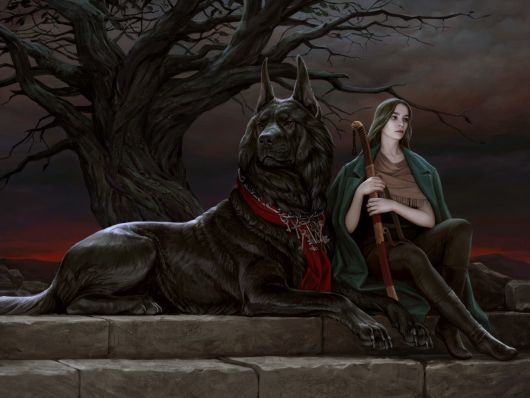Dog Training (sage study)
Skill at dog training covers the use of dogs as hunters, herders and trackers, as well as combatants in war, with additional skills in managing packs of dogs (especially as dog sled teams), administering to their health, breeding and recognition of breeding, and a knowledge of special training techniques, enabling the learning of skills and tricks. Dogs have a special relationship with humans ~ "man's best friend" being an adage with a grounding in truth ~ culminating with the formation of a bond of friendship between dog and master.
Like horses, dogs are classified according to their primary form or function, based on size, physical ability and training. Their predatory nature makes them well suited for combat, hunting and herding, with the largest breeds most often chosen for these purposes. Some hunting and all racing dogs are bred for their leanness and speed. Bird and rodent dogs are bred for scenting capability and size (smaller, so they can fit into tight spaces in search of their quarry). Among the nobility and upper classes, certain breeds are favored for purely aesthetic characteristics.
In most cases, a dog can be described by its primary function
- pets (low energy): bred by the societal elite; kept for their aesthetic appeal and social status
- herders (high energy): bred to control large herds of domestic animals; kept for their energy and pack mentality
- hounds (medium energy): bred to track and hunt large game; kept for their ability to sight or scent prey and run it to ground
- sporting dogs (medium energy): bred to chase, catch and retrieve small game; kept for their ability to execute complex tasks
- terrier dogs (high energy): bred to chase and kill rodents or pests; kept for their ability to outsmart and outrun the smallest prey
- working dogs (medium energy): bred to guard people, pull carts or sleds, or fight in battle; kept for their extreme loyalty and willingness to follow commands
basic statistics
Contents
Amateur
- Domesticate Dogs: gives the basic training to young or feral dogs, enabling them to perform as ordinary working animals.
- Feeding & Diet: gives judgement regarding the dietary needs of dogs.
- Dog Handling I: enables the character to teach simple tricks and give commands.
Authority
- Dog Physiology: improved knowledge of the maintenance and restoration of health in dogs.
- Dog Handling II: enables the character to teach complex tasks and jobs.
- Pack Training: grants techniques for training multiple dogs to operate as part of team.
Expert
- Dog Breeding: grants knowledge to select breeding pairs, in order to produce pups suitable to a specific sort of work.
Sage
- Companion: character is able to form a special bond with their animal that allows for greater command and control.
See Also,
Assassin's Sage Abilities
Fighter Sage Abilities
Paladin Sage Abilities
Ranger Sage Abilities
